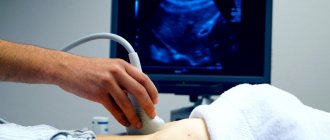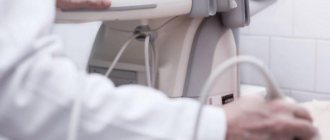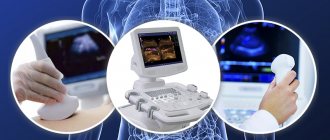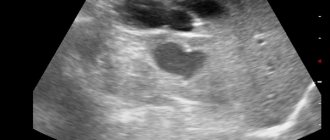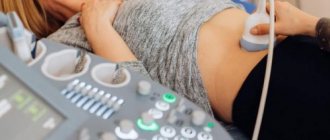Pain and discomfort in the abdomen can be symptoms of many diseases, but they can also be triggered by reasons unrelated to the health of the gastrointestinal tract: allergies, hunger, stress, the arrival of the first menstruation, etc. Modern diagnostics will help to establish the exact cause of the ailment and prescribe the correct treatment.
After examining and interviewing the patient, the gastroenterologist recommends the necessary studies.
At MedicCity, all diagnostic equipment is represented by expert-class equipment, and highly qualified specialists with extensive experience examine the health of patients.
We will help you deal with a medical problem of any complexity!
Diagnostics of abdominal organs
Diagnosis of abdominal pain involves, depending on the patient’s condition and the nature of the symptoms, the use of various instrumental methods. It can be:
- Ultrasound of the abdominal organs;
- gastroscopy (or esophagogastroduodenoscopy, endoscopy);
- CT scan;
- MRI;
- fluoroscopy.
Ultrasound examination of the abdominal organs (ultrasound of the liver, gallbladder, pancreas, kidneys, bile ducts, spleen, regional lymph nodes) is the most gentle, painless and non-invasive diagnostic method, which is highly informative.
When is an ultrasound of the gallbladder prescribed?
The gallbladder is one of the organs of the abdominal cavity, pear-shaped, small in size, located directly under the liver. Ducts connect the gallbladder to the liver. An ultrasound of the gallbladder is necessary for diseases and symptoms:
- pain in the liver area;
- cholelithiasis;
- abnormalities in the development of the organ and ducts;
- inflammatory diseases (cholecystitis);
- polyps;
- neoplasms of any type;
- dropsy.
If you have symptoms of at least one of the above diseases, we recommend that you consult a doctor and undergo an ultrasound of the gallbladder. If you have symptoms indicating diseases of this organ, then an ultrasound of the gallbladder ducts will help find the cause of your concerns. Conclusion An ultrasound will show possible disruptions in development, neoplasms, and more.
Preparing for an ultrasound of the gallbladder: features
The main obstacle to performing an ultrasound of the abdominal organs can be gases in the intestines. Therefore, before an ultrasound scan of the gallbladder, you need to limit yourself to the following:
- A few days before the examination, you need to exclude foods that contribute to the development of flatulence from your diet. Among them: vegetables and fruits rich in fiber, bread made from dark grains and sweets.
- Is it possible to eat before an ultrasound of the gallbladder? No, ultrasound is performed on an empty stomach, that is, 6-12 hours before the procedure you cannot eat anything, the last meal should be satisfying, but not aggravating.
- A week before the test, you should stop drinking alcohol and eating fatty foods.
The patient must know how to prepare for an ultrasound of the gallbladder. The procedure is quick and unnoticed, and there are no contraindications to ultrasound, therefore, ultrasound of the abdominal cavity can be performed even on children.
The essence of the abdominal ultrasound method
The operating principle of ultrasound is based on the use of ultrasonic waves, which do not have any harmful effect on the body. During the study, a beam of waves passes deep into the patient’s tissue through the contact of the device’s sensor with the patient’s body. Some of the waves are absorbed, some are reflected, and this information is converted using a special program into an image on the monitor.
Upon completion of the procedure (it takes on average 10-20 minutes), the ultrasound diagnostic doctor analyzes the data obtained and issues a conclusion about the patient’s health condition.
Ultrasound of the abdominal cavity helps to assess the size, shape, and correct position of internal organs, to notice pathological processes and the degree of damage in the early stages, and to monitor the condition of lymph nodes and blood vessels. The harmlessness and non-invasiveness of this diagnosis allows it to be prescribed to patients of different ages and in different physical conditions.
During an ultrasound of the abdominal and retroperitoneal region, the following internal organs can be examined:
- gallbladder (ultrasound of the gallbladder, (ultrasound of stones);
- pancreas (ultrasound of the pancreas, ultrasound of the pancreas);
- spleen (ultrasound of the spleen);
- kidneys, adrenal glands (ultrasound of kidneys);
- liver (ultrasound of the liver);
- lymph nodes (ultrasound of abdominal lymph nodes, ultrasound of retroperitoneal lymph nodes);
- blood vessels (ultrasound of the portal vein, ultrasound of the portal system, ultrasound of the aorta, ultrasound of the abdominal aorta, ultrasound of the abdominal aorta, ultrasound of the abdominal aorta);
- bile ducts, etc.
Ultrasound of the pancreas for abdominal pain
The pancreas is a secretory organ of the gastrointestinal tract. It is located below the stomach, behind the intestinal loops. Consequently, the doctor is not able to detect pathologies in the development of the gland using palpation. Ultrasound of the pancreas is a non-invasive instrumental method that allows you to detect changes in the organ in a timely manner and prevent the development of pathologies.
An ultrasound examination of the pancreas is most often carried out in combination with an examination of the liver, since a disease of one organ causes changes in the other. Indications for performing an ultrasound of the pancreas:
- pain, as well as discomfort in the pancreas area (upper left part of the abdominal cavity);
- suspicion of pancreatitis, or a previously established diagnosis;
- fatty infiltration;
- feeling of heaviness after eating;
- unhealthy yellow skin color.
How to prepare for an ultrasound of the pancreas yourself?
Preparation for an ultrasound of the pancreas consists of dietary restrictions and abstinence from meals 6-12 hours before the procedure. The study is carried out on an empty stomach; a few days before, you need to limit the consumption of black bread, fresh vegetables and fruits, and confectionery. The price for ultrasound of the pancreas can be found on the ON Clinic website or by calling the operators.
If you have pancreatitis or suspect it, you should seek help from a doctor. Self-medication can have a negative impact on your health.
Who is indicated for ultrasound of the abdominal organs?
The study can be prescribed to patients with complaints of symptoms and conditions such as:
- abdominal trauma;
- stomach ache;
- abdominal and back pain;
- pain in the hypochondrium;
- pain in the side;
- frequent attacks of nausea, heartburn, vomiting;
- coating on the tongue, bad breath;
- flatulence, constipation/diarrhea;
- blood in stool;
- change in the color of urine, feces (darkening, discoloration);
- signs of fluid accumulation in the abdomen; presence of sand and/or stones;
- suspicion of the presence of a foreign object;
- suspicion of appendicitis; preparation for surgery; suspicion of a tumor process, etc.
Routinely, ultrasound of the abdominal cavity is performed to monitor the results of treatment, including for oncological pathologies.
There are practically no contraindications to abdominal ultrasound. Diagnosis is not carried out if the patient has a skin disease or skin damage that makes it difficult for the sensor to slide. The examination can also be complicated by failure to follow the recommended diet on the eve of the examination, or the patient’s excess fat deposits in the abdominal area (gases in the gastrointestinal tract and dense fatty tissue can impede the propagation of ultrasonic waves and affect the accuracy of the result). A relative contraindication to the procedure may be a gastroscopy performed on the same day - due to the fact that during this examination a certain amount of air enters the body.
What does an ultrasound of the abdominal organs show?
Thanks to the high quality of modern ultrasound equipment, this study allows us to identify:
- structural anomalies;
- organ damage;
- internal bleeding;
- inflammatory processes, infections;
- degenerative processes;
- abnormal accumulation of fluid;
- stones in the kidneys, gall bladder and bile ducts;
- blood supply disorders, vascular pathologies;
- presence of a foreign object; neoplasms, etc.
Ultrasound of an inguinal hernia Often, an examination of the abdominal cavity is performed if an inguinal hernia is suspected. With this disease, the abdominal organs protrude under the skin through the so-called “hernial orifice” - natural openings in the groin area of the abdomen. Due to the fact that the anatomy of women and men is different, the methods for diagnosing an inguinal hernia in patients of different sexes also differ. Thus, women may additionally undergo an ultrasound scan of the pelvic organs to confirm the presence of a hernia and determine the contents of the hernial sac.
Ultrasound of the groin area in men to determine the nature of the contents of the hernial sac involves studying the area of the peritoneum, scrotum, inguinal canals and lymph nodes (ultrasound of the inguinal hernia in men, ultrasound of the inguinal lymph nodes, ultrasound of the groin area, ultrasound of the scrotum).
Ultrasound of the abdominal cavity. Preparing for the study
Ultrasound scanning of the abdominal organs requires mandatory special training. Thus, 2-3 days before the procedure, it is prohibited to consume foods that provoke gas formation (fruits, raw vegetables, rye bread, dairy products, sweets, carbonated drinks, juices, coffee, etc.).
The day before the test, you can start taking medications that help reduce gas formation (for example, espumizan). On the eve of the ultrasound, patients suffering from constipation should take care of forced bowel cleansing.
Dinner on the eve of the procedure should be early (before 20.00) and light. You cannot have breakfast on the day of the procedure.
It is also necessary to avoid drinking and smoking (!).
If the study is scheduled for the afternoon, the issue of breakfast should be discussed with your doctor.
Ultrasound of the spleen: indications and self-preparation
The spleen is a small organ located in the left hypochondrium below the stomach. It is responsible mainly for the normal functioning of the human immune system, as well as for hematopoiesis. Indications for ultrasound of the spleen:
- past infectious and viral diseases;
- chronic liver diseases;
- mechanical damage to the organ;
- suspicions of benign or malignant tumor formations;
- organ enlargement and more.
Ultrasound of the liver and spleen should be performed together, this is due to the close location of the organs. Accordingly, liver diseases can be transferred to the nearby spleen.
Preparing for an ultrasound of the spleen yourself
Preparation for an ultrasound of the spleen coincides with preparation for an ultrasound for the rest of the abdominal organs. Main points:
- abstaining from meals 6-12 hours before the study;
- do not eat brown bread, vegetables and fruits rich in fiber, fatty confectionery products;
- inhibit gas formation with medications.
Using ultrasound, you can identify malformations of the spleen, damage to the organ, inflammatory processes in the immune system, disorders of the hematopoietic function of the body, and liver disease.
Ultrasound of the abdominal cavity at the MedicCity clinic
Did your attending physician prescribe an ultrasound scan of your liver, gallbladder, or pancreas, or did you decide to undergo this study yourself? We need a clinic with reliable equipment and qualified specialists!
At the MedikCity clinic, ultrasound diagnostics are carried out using expert-class equipment; our ultrasound diagnostic doctors know all the professional secrets and have extensive practical experience. Within half an hour after the examination, you will receive a clear image and its high-quality description. Ultrasound at MedicCity is carried out by appointment, just like other studies. Take care of your health right now!
